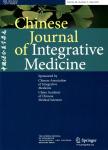Effect of Shengmai Injection(生脉注射液) on Cardiac Function and Inflammatory Reaction in Patients with Acute Coronary Syndrome
Effect of Shengmai Injection(生脉注射液) on Cardiac Function and Inflammatory Reaction in Patients with Acute Coronary Syndrome作者机构:Department of Internal Cardiology Xinhua Hospital Affiliated to Shanghai Jiaotong Medical University School of Medicine Department of Laboratory Ruijin HospitalShanghai Jiaotong University School of Medicine
出 版 物:《Chinese Journal of Integrative Medicine》 (中国结合医学杂志(英文版))
年 卷 期:2008年第14卷第2期
页 面:107-110页
核心收录:
学科分类:1007[医学-药学(可授医学、理学学位)] 100506[医学-中医内科学] 1006[医学-中西医结合] 1005[医学-中医学] 1002[医学-临床医学] 10[医学] 100602[医学-中西医结合临床]
主 题:Shengmai Injection acute coronary syndrome C-reactive protein inflammatory reaction cardiac function
摘 要:Objective: To confirm the effect of Shengmai Injection (生脉注射液, SMI) in improving cardiac function in patients with acute coronary syndrome (ACS) and to explore its influence on inflammatory reaction in patients. Methods: Ninety ACS patients were randomized into two groups, the control group treated with conventional therapy and the SMI group treated with SMI. The patients' cardiac function was noted and the content of high sensitive C-reactive protein (hs-CRP) in venous blood was measured before treatment and 1 week and 3 weeks after treatment, so as to observe and compare their changes between the two groups. Results: The cardiac output, stroke volume and ejection fraction in the SMI group after 3 weeks of treatment were all higher than those in the control group (P〈0.05). The serum content of hs-CRP was reduced in both groups (P〈0.05), but the reduction in the SMI group was more significant than that in the control group (P〈0.05). Conclusion: SMI could improve the cardiac function and further inhibit the inflammatory reaction in patients with ACS.



